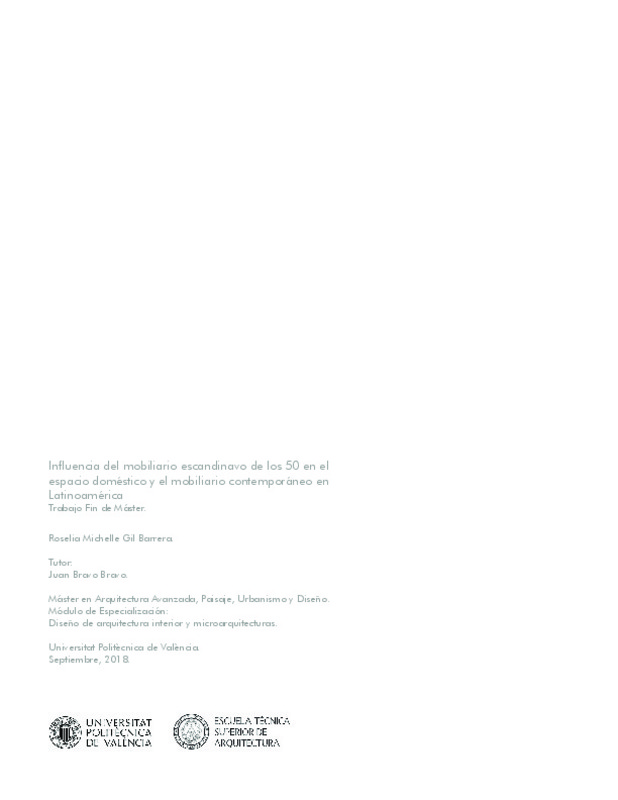JavaScript is disabled for your browser. Some features of this site may not work without it.
Buscar en RiuNet
Listar
Mi cuenta
Estadísticas
Ayuda RiuNet
Admin. UPV
Entre Escandinavia y Latinoamérica: mobiliario e interiores domésticos de mediados del siglo XX
Mostrar el registro sencillo del ítem
Ficheros en el ítem
| dc.contributor.advisor | Bravo Bravo, Juan Antonio
|
es_ES |
| dc.contributor.author | Gil Barrera, Roselia Michelle
|
es_ES |
| dc.date.accessioned | 2018-11-20T14:37:26Z | |
| dc.date.available | 2018-11-20T14:37:26Z | |
| dc.date.created | 2018-09-18 | |
| dc.date.issued | 2018-11-20 | es_ES |
| dc.identifier.uri | http://hdl.handle.net/10251/112830 | |
| dc.description.abstract | [ES] Este trabajo propone estudiar el mobiliario escandinavo de los años 50, cómo ha influido en la composición del espacio doméstico en la vivienda contemporánea latinoamericana, convirtiéndose en una tendencia del interiorismo, no solo como una tendencia del diseño sino también como reflejo de un estilo de vida en el espacio cotidiano. En la primera parte del trabajo se hace referencia a la contribución de los escandinavos en la historia del diseño y su posición dentro de la industria hasta llegar a su mayor esplendor en la década de los 50 después de una exposición que recorrió los Estados Unidos y Canadá, donde se acuñó por primera vez el término Diseño escandinavo. En la segunda parte se describe el espacio doméstico latinoamericano a través de una filosofía funcional y estética influenciada de la tendencia escandinava, también se analiza lo que los diseñadores latinoamericanos han aprendido esta industria para aplicarlo al mobiliario actual. Se finaliza explorando algunos casos de estudios que han seguido esta línea dentro del interiorismo. En la conclusión se reflexiona sobre la vigencia e influencia que tiene el diseño escandinavo de los 50 en relación a la producción del mobiliario contemporáneo dentro del espacio doméstico actual en América Latina. | es_ES |
| dc.description.abstract | [EN] This work proposes to study the Scandinavian furniture of the 1950s, how has affected the composition of the domestic space in contemporary housing, becoming a trend in interior design, not just as a "design trend" but also to reflect a way of a lifestyle in the everyday space. The first part of the work focuses in the contribution of the Scandinavians in the history of design and their position within the industry to reach peak in the decade of the 50s after an exhibition that toured the United States and Canada where the term "Scandinavian design" was coined for the first time. The second part describes the Latin American domestic space through a "functional and aesthetic" philosophy influenced the Scandinavian trend, also discusses what American designers have learned this industry to apply it to the current furniture. Ends analyzing some case studies that have followed this line. At the conclusion he ponders the effect and influence, Scandinavian design of the 50s has in relation with the production of contemporary furniture within the current domestic space in Latin America. | es_ES |
| dc.format.extent | 100 | es_ES |
| dc.language | Español | es_ES |
| dc.publisher | Universitat Politècnica de València | es_ES |
| dc.rights | Reconocimiento - No comercial - Sin obra derivada (by-nc-nd) | es_ES |
| dc.subject | Diseño escandinavo | es_ES |
| dc.subject | Espacio doméstico | es_ES |
| dc.subject | Diseño de interiores | es_ES |
| dc.subject | Mobiliario latinoamericano | es_ES |
| dc.subject | Años 50 | es_ES |
| dc.subject | Scandinavian design | es_ES |
| dc.subject | Domestic space | es_ES |
| dc.subject | Interior design | es_ES |
| dc.subject | Latin American furniture | es_ES |
| dc.subject | The 1950s | es_ES |
| dc.subject.classification | COMPOSICION ARQUITECTONICA | es_ES |
| dc.subject.other | Máster Universitario en Arquitectura Avanzada, Paisaje, Urbanismo y Diseño-Màster Universitari en Arquitectura Avançada, Paisatge, Urbanisme i Disseny | es_ES |
| dc.title | Entre Escandinavia y Latinoamérica: mobiliario e interiores domésticos de mediados del siglo XX | es_ES |
| dc.type | Tesis de máster | es_ES |
| dc.rights.accessRights | Abierto | es_ES |
| dc.description.bibliographicCitation | Gil Barrera, RM. (2018). Entre Escandinavia y Latinoamérica: mobiliario e interiores domésticos de mediados del siglo XX. http://hdl.handle.net/10251/112830 | es_ES |
| dc.description.accrualMethod | TFGM | es_ES |
| dc.relation.pasarela | TFGM\80000 | es_ES |
Este ítem aparece en la(s) siguiente(s) colección(ones)
-
ETSA - Trabajos académicos [4688]
Escuela Técnica Superior de Arquitectura






